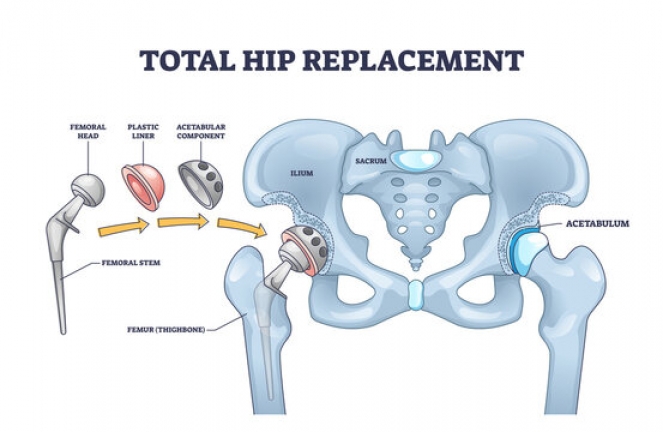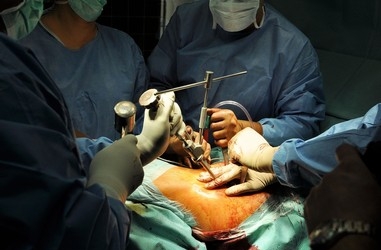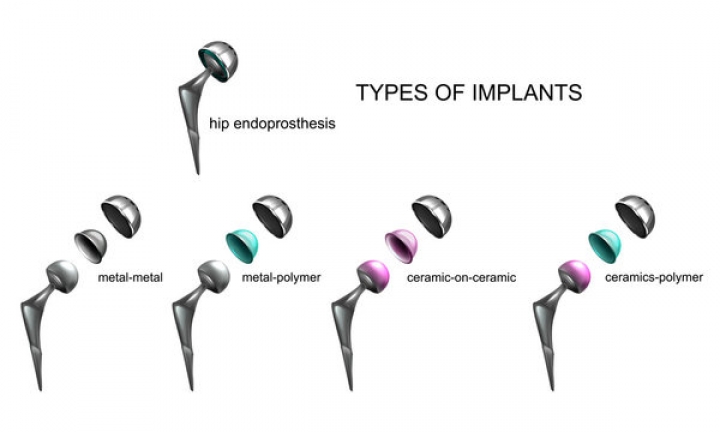Hip Replacement Surgery in Cheshire
Total Hip Replacement
Hip Injection
Hip replacement surgery is a common surgical procedure that involves the replacement of a damaged or diseased hip joint with an artificial implant. It is typically recommended for patients with severe hip pain and limited mobility caused by arthritis, injury, or other conditions.
Mr. Nikhil Pradhan is widely regarded as the best hip replacement surgeon in Cheshire, U.K. His expertise and experience in hip replacement surgery are unparalleled.
Mr. Nikhil Pradhan leads the Cheshire Hip & Knee Clinic, a dedicated hip replacement clinic in Cheshire that provides comprehensive care for patients undergoing this life-changing procedure.

Doctors may recommend hip replacement surgery if your hip joint is severely damaged or worn out and it is causing intense pain and mobility issues. If you live in Cheshire and require surgery, consult Mr. Nikhil Pradhan, one of the leading hip replacement surgeon in Cheshire, U.K. For more details, contact today!
Preparation for Hip Replacement Surgery:
Before the surgery, the hip replacement surgeon in Cheshire will conduct a thorough medical evaluation and may recommend imaging tests such as X-rays, MRI scans, or CT scans to assess the extent of joint damage.
The patient will also need to follow certain preoperative instructions, such as avoiding food and drink for a certain period before the surgery and stopping certain medications that may interfere with blood clotting.
The Procedure:
During the surgery, the Hip replacement specialist in Cheshire, U.K will make an incision in the hip area to access the joint.
The damaged bone and cartilage will be removed, and the prosthetic components will be inserted and secured in place. The incision will then be closed, and the patient will be moved to a recovery area.

ANATOMY
The hip is a ball and socket joint where the head of the femur sits in the cup-like acetabulum. A smooth cushion of articular cartilage covers the end of both these bones. The thick muscles of the buttock at the back, and the muscles of the thigh at the front surround the hip.
Healthy articular cartilage absorbs stress and allows the bones to glide across each other smoothly, allowing pain free movement and activities. The cartilage is kept slippery by joint fluid (synovial fluid) made by the joint lining (synovial membrane). The fluid is contained in a soft tissue enclosure around the hip called the joint capsule. The ligaments and strong muscles surrounding the hip give the hip power and stability.
Different conditions such as rheumatoid arthritis and osteoarthritis can cause hip joint damage that requires surgery. However, it is always advised to consult joint experts before making the final decision. Visit Mr. Nikhil Pradhan’s hip replacement clinic in Cheshire, U.K for consultation and best advice.
OSTEOARTHRITIS (OA)
This is a degenerative disease and is often referred to as wear and tear arthritis. Years of normal use can cause the cartilage to crack and wear away and it is not able to heal itself. As the ends of the bones rub against each other, they become rough and pitted and eventually the cartilage may wear away altogether Small outgrowths of bone spurs, called osteophytes, may form around the joint.
At first the hip may be stiff, but as the bones begin to rub together you are more likely to feel increasing pain. The onset of osteoarthritis can occur from previous injury to the hip. Cartilage injuries, infection or bleeding within the joint can also damage the joint surface of the hip.
According to the World Health Organisation osteoarthritis affects half of the world’s population over the age of 65. The causes are not well understood. Ageing and genetic factors are among the major causes associated with OA

Types of Hip Replacement Implants:
- Total Hip Replacement (THR): Replaces both ball and socket with various materials like metal-on-polyethylene or ceramic-on-ceramic.
- Metal-on-Metal Implants: Both components are metal; concerns about metal ion release have led to decreased use.
- Ceramic-on-Polyethylene Implants: Combines ceramic ball with polyethylene socket for durability.
- Resurfacing Implants: Partial replacement, only the ball is replaced with a metal cap.
- Custom Implants: Tailored solutions for unique cases, using advanced imaging and 3D printing.
Alternatives to Hip Replacement Surgery
Not everyone wishes to have, or requires, a hip replacement when they have damaged their articular cartilage. Some people will have different pain tolerances and others may not wish to undertake the risks this surgery carries. Others choose to accept and live with the pain they have. Thus, if you do not wish to undergo hip replacement surgery in Cheshire, U.K.
Here are some alternatives:
- Regular pain medication.
- Using walking aids to relieve any stress on the joint.
- Weight loss to reduce the stress on the joint.
- Exercises to maintain joint movement, muscle strength and help pain relief.
- Adaptations and modifications to furniture, for example, raising the height of an armchair, bed, or using a raised toilet seat.
- Changing activities you do to reduce pain.
Only when the above measures fail to give acceptable pain relief, will a Total Hip Replacement be offered to you.
Benefits of Total Hip Replacement
Once your new joint replacement has healed properly you should look forward to some, or all, of the following benefits.
- Greatly reduced joint pain
- Correction of deformity, for example, unequal leg length.
- Improved quality of life by allowing you to do daily activities in greater comfort.
What to Expect After The Hip Replacement?
It is important to realise that not all your hip pain may be abolished after your surgery. Immediately after surgery, the gnawing severe pain will have gone and be replaced by surgical pain. This may last up to 6-12 weeks but should lessen over time. Pain medication may still be needed because of this. You may experience occasional pain in your new hip after walking and other activities.
The relief of this type of pain is individual, depending on the severity of any pre-operative deformity in your hip, on the state of your muscles, and so on. Remember your surgeon replaced only the damaged joint surfaces but could do nothing to the muscles, ligaments and other soft tissues equally damaged by the “joint” disease. For more details about recovery, you must discuss with a hip replacement specialist in Cheshire, United Kingdom.
15 Tips for a Successful Total Hip Replacement Recovery
Recovering from a total hip replacement surgery requires patience, dedication, and adherence to a well-structured plan.
Here are some tips to help ensure a successful recovery:
- Follow Medical Advice: Listen to your orthopedic surgeon, physical therapist, and healthcare team. They will provide specific guidelines for your recovery based on your individual needs and progress.
- Pain Management: Proper pain management is essential for a smooth recovery. Take prescribed pain medications as directed and communicate any concerns about pain to your healthcare provider.
- Physical Therapy: Engage in regular physical therapy sessions as recommended by your healthcare team. Physical therapists will guide you through exercises to regain strength, flexibility, and mobility in the hip joint.
- Follow Exercise Guidelines: Perform the prescribed exercises consistently, even if they seem challenging at first. Gradually increase the intensity and frequency of exercises as your strength improves.
- Maintain a Healthy Diet: A balanced diet rich in vitamins, minerals, and protein is crucial for healing and strengthening your body. Adequate nutrition supports tissue repair and overall recovery.
- Stay Hydrated: Drinking enough water helps prevent complications and supports healing. Dehydration can slow down the recovery process.
- Weight Management: Maintain a healthy weight to reduce stress on the hip joint and improve overall mobility. Consult your healthcare provider for guidance on appropriate weight management strategies.
- Mobility Aids: Use any mobility aids, such as crutches or a walker, as recommended by your healthcare provider. Gradually transition to walking without assistance as your strength improves.
- Safe Movements: Avoid movements that could put excessive strain on the hip joint, such as crossing your legs or bending at the waist. Follow the movement restrictions advised by your surgeon.
- Proper Rest: Allow your body ample time to rest and recover. Aim for quality sleep to support healing and tissue repair.
- Wound Care: Keep the surgical incision clean and dry to prevent infection. Follow your surgeon’s instructions on wound care and changing dressings.
- Avoid Falls: Minimize the risk of falls by ensuring your living space is free of tripping hazards, using non-slip mats, and being cautious when moving around.
- Gradual Resumption of Activities: As you progress in your recovery, gradually reintroduce daily activities and hobbies. Consult your healthcare provider before engaging in more strenuous activities.
- Communicate: If you experience any unusual symptoms, pain, or complications, reach out to your healthcare provider immediately. Early intervention can prevent potential issues from worsening.
- Stay Positive: Recovery can be challenging, but maintaining a positive attitude can contribute to your overall well-being and motivation. Celebrate your progress and achievements along the way.
Conclusion:
If you are considering total hip replacement surgery in Cheshire, it is important to choose a reputable and experienced hip replacement surgeon.
Mr. Nikhil Pradhan is widely recognized as the best hip replacement surgeon in Cheshire, U.K and his hip replacement clinic in Cheshire provides comprehensive care and support for patients undergoing this procedure.
Contact his clinic to learn more about the benefits of total hip replacement surgery and how it can improve your quality of life.
Total Hip Replacement
Hip Injection
Want to find out more? Speak to one of our team today
